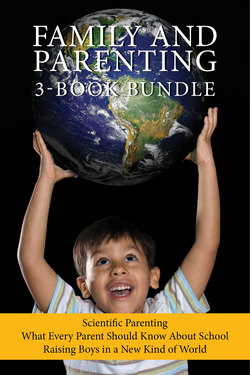Читать книгу Family and Parenting 3-Book Bundle - Michael Reist - Страница 3
На сайте Литреса книга снята с продажи.
Preface
ОглавлениеYou’ve heard the expression before, I’m sure: when all you have is a hammer, everything looks like a nail.
I’ve always been fascinated by parenting, how it works and, perhaps even more so, how it doesn’t. I remember as a child listening in on my parents’ conversations with family and friends, gathering gossip on the problems festering beneath the surface of my neighbourhood. So-and-so’s an alcoholic. So-and-so can’t control her weight. So-and-so dropped out of school. So-and-so has “some problems upstairs.” The problems upstairs intrigued me most of all. It was a mysterious, vaguely menacing term, hinting at something deeper and more complex than drinking or obesity or illness — something in which all those other problems were hopelessly entangled.
I watched and I listened, and as I grew, I continued to wonder about where these social problems originated. We can discuss history, systemic poverty, and cultures of oppression, but I found these provide explanations rather than answers — it’s a subtle difference between those two, but key. Explanations tell us why something is wrong; answers tell us how to fix it. We can’t change our pasts, but we can change our futures. And, to polish a tarnished cliché, the future lies in the hands of our children. I’d spent my entire life spotting nails; parenting, I discovered, was my hammer.
My interest in parenting followed me to graduate school, where I began to study the science underlying child development. The broad trends, I found, were obvious — abuse begets abuse, addiction begets addiction, troubled homes breed troubled youths. It’s in the specifics that things get complicated. Because some kids break free from the cycle of addiction, poverty, and violence. There is something special about these children, but what exactly that might be is difficult to quantify. We call it resilience, but what do we mean by that, really? And why do some children have it when others clearly don’t? Intelligence is one answer. Epigenetics, a fascinating new science, offers another. But more than anything else, it seems that relationships make the difference. Kindness, support, and love lay a foundation solid enough to weather the harshest storms. And it need not come from home (though of course that helps); teachers, coaches, grandparents, and neighbours can all act as vital lifelines to children in need.
There’s no one “right” way to parent a child. Truly gifted parents don’t have access to a special guidebook or subscribe to any one theory of child-rearing. They simply become the people their children need them to be. They learn. They listen. They adapt. They push when they need to and hold back when they can. They evolve as their children do, developing new solutions to new problems.
There are no easy answers. This book was not intended to preach about how to parent, but to teach about why parenting matters. Parents know, deep down, that theirs is the most important job in the world. This book tells them why. It should be the book you turn to when you are feeling guilty about not spending enough time at work. The time you spend with your children is time well spent.
The studies and experiments we explore pull back the curtain on the mysteries of early childhood, allowing us a glimpse at the amazingly complex mechanisms at play during a child’s first critical years of life. The study of child development is not a homogenous field. It draws conclusions from many different disciplines within medicine, nursing, psychology, sociology, biology, and even chemistry. It trawls the very fringe of scientific inquiry, exploring the findings excavated from the depths of science’s latest theories. It traces conditions as diverse as heart disease, depression, cancer, ADHD, diabetes, alcoholism, aggression, and asthma to their roots in early childhood. It strives to learn exactly what babies need to reach their potential, and examines the consequences when these needs aren’t met. My goal is to gather this information and present it in an accessible, engaging way.
Some may call this another “blame the mother” book. I don’t see it that way. It’s true that mothers shoulder a disproportionate amount of the responsibility of child-rearing, and catch flak for their failures while their successes yield them little credit. The media seems to fixate on the monstrous, caricaturized figure of the Bad Mother, but I truly believe that all parents try to do their best. And in the most egregious cases of bad parenting, namely abuse, culpability becomes a capricious, shifting thing. Do we blame the mother alone? Where was the father in all this? And what about the neighbours, who watched scenes of abuse unfold and said nothing? Or the ER nurse who asked too few questions? Where were the police? And where did these abusive behaviours come from in the first place? Do we blame the grandparents? Did someone abuse them? How far back do we go? How can you spot the genesis of a cycle of abuse? A circle has no beginning.
Blame is unproductive. We are a society, and we succeed or fail as one. The brighter and better and more innovative we raise the next generation to be, the better all of our lives become. Parents need support, and providing it can only benefit all of us. And our efforts now will pay dividends generation down the line. As leading attachment theorist Pat Crittenden said, we are raising the next generation of parents.
Parenting is my hammer. And that’s fine. Even the simplest of tools can build structures of great and lasting beauty.
